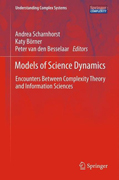
Models of science dynamics: encounters between complexity theory and information sciences
Scharnhorst, Andrea
Börner, Katy
Besselaar, Peter van den
Models of Science Dynamics aims to capture the structure and evolution of science, the emerging arena in which scholars, science and the communication of science become themselves the basic objects of research. In order to capture the essence of phenomena as diverse as the structure of co-authorship networks or the evolution of citation diffusion patterns, such models can be representedby conceptual models based on historical and ethnographic observations, mathematical descriptions of measurable phenomena, or computational algorithms. Despite its evident importance, the mathematical modeling of science still lacks a unifying framework and a comprehensive study of the topic. This volume fillsthis gap, reviewing and describing major threads in the mathematical modelingof science dynamics for a wider academic and professional audience. The modelclasses presented cover stochastic and statistical models, system-dynamics approaches, agent-based simulations, population-dynamics models, and complex-network models. The book comprises an introduction and a foundational chapter that defines and operationalizes terminology used in the study of science, as well as a review chapter that discusses the history of mathematical approaches tomodeling science from an algorithmic-historiography perspective. It concludeswith a survey of remaining challenges for future science models and their relevance for science and science policy. Edited and Authored by leading researchers in the field. First interdisciplinary treatment of this topic and the interface of information and systems sciences, scientometrics and social complex networks. Addresses a wider academicand professional audience. INDICE: Part I Foundations. An Introduction to Modeling Science: Basic Model Types, Key Definitions, and a General Framework for the Comparison of Process Models. Mathematical Approaches to Modeling Science From an Algorithmic-historiography Perspectice. Part II Exemplary Model Type. Knowledge Epidemics andPopulation Dynamics Models for Describing Idea Diffusion. Agent-based Models of Science. Evolutionary Game Theory and Complex Networks of Scientific Information. Part III Exemplary Model Applications. Dynamic Scientific Co-authorshipNetworks. Citation Networks. Part IV Outlook. Science Policy and the Challenges for Modeling Science. Index.
- ISBN: 978-3-642-23067-7
- Editorial: Springer Berlin Heidelberg
- Encuadernacion: Cartoné
- Páginas: 340
- Fecha Publicación: 31/10/2011
- Nº Volúmenes: 1
- Idioma: Inglés
